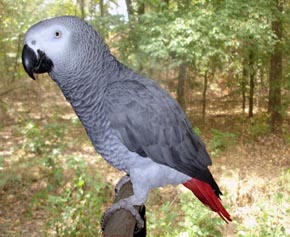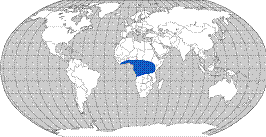African Grey Parrot – "Ellie"
(Psittacus erithacus)

“Ellie”

Distribution: African Grey Parrots are found in the central part of Africa.
Diet: African Grey parrots are primarily vegetarians eating a variety of seeds, berries, nuts, fruits, and leafy matter.
Lifespan: These parrots usually live for about 20 years in the wild, but have been known to live for over 70 years in captivity.
Reproduction: Breeding occurs at 3-5 years of age. They nest in tree hollows about 2 1/2 – 7 1/2 feet off the ground. The female alone incubates 2-3 eggs for 21-30 days. Both parents feed the chicks until the latter leave the nest around 10 weeks of age. The chicks and adults will then forage together as a family group until the young become fully independent.
Did You Know?
- Parrots have been kept as pets for over 4,000 years. Pet parrots have been noted in Egyptian hieroglyphics. They were also valued by the Greeks and Romans for their ability to talk. King Henry VIII had a pet African Grey Parrot.
- African Grey Parrots are well known for their extensive vocabularies and ability to mimic accurately not only words and phrases (with a potential of over 2000 words and noises), but also specific inflections of their owners.
- Although the African Grey Parrot is not currently listed as a threatened or endangered species, it is believed that continued trapping of wild parrots for pet trade is leading to an alarming decrease in wild populations. Conservation efforts focus on reduction of trapping, and on establishing laws designed to protect wild parrot populations.
- Parrots in general can make interesting and entertaining pets, but they require hours of daily human attention. They are certainly not desirable as pets for most people. They are usually loud to include ear piercing screams, and often bite very hard.
- Having a pet parrot can be compared to “owning” a pet with the intelligence of a two year old child, for 50 years. Although a demanding commitment on the part of an owner, any pet parrots should be acquired only from a source where said birds are bred in captivity rather than taken from the wild.
- All parrots used in our educational programs are birds that the original owner or owners found they no longer had time to attend to and care for these active birds.

